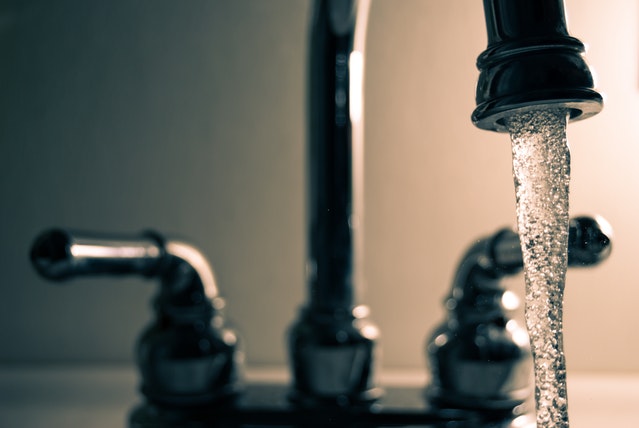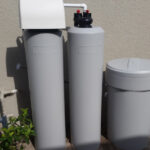[tm_pb_section admin_label=”section”][tm_pb_row admin_label=”row”][tm_pb_column type=”4_4″][tm_pb_text admin_label=”Text” text_orientation=”left” use_border_color=”off” border_color=”#ffffff” border_style=”solid”]
You’ve probably heard the terms hard and soft when referring to water. And while one can be great to use, the other can be dangerous. But how can something colorless, odorless, and vapid be classified into two groups? And why is it that one is good and the other is bad? Well, water is not always crystal clear when examined under a microscope. It can contain contaminants that are invisible to the naked eye. So, even if you are under the impression that you have cleaned yourself or your home, using the wrong type of water can prove you wrong. As a result, we came to your aid with this article that will explain if soft water or hard water is better for cleaning. We will also go through what you can do to ensure the water you use is clean and safe.
What makes water hard or soft?
On its journey to your home, water comes into contact with different particles. Most of them are harmless and are composed of dissolved minerals such as iron, calcium, magnesium, or manganese. Now, the problems start when these particles are in a high concentration. Hard water has a high concentration of minerals, measured in milligrams per liter. If soft water has a concentration of 0-17 mg/L, hard water can contain anywhere from 120 – 180 mg/L. As you can see, the difference is quite remarkable.
However, do not assume that soft water is free of any particles. Instead of magnesium and calcium, soft water contains sodium or salt. But, these particles aren’t as dangerous for you or your household. So, if you want to know which type of water you have, it’s easy to find out. You can schedule a free water test in FL, and depending on the results, choose the water treatment services in Florida that suit your needs the best.
[/tm_pb_text][tm_pb_image admin_label=”Image” src=”https://www.centralfloridawatertreatment.com/wp-content/uploads/2022/04/Soft-water-vs-Hard-water-for-cleaning-1.jpg” show_in_lightbox=”off” url_new_window=”off” use_overlay=”off” animation=”left” sticky=”off” align=”left” force_fullwidth=”off” always_center_on_mobile=”on” use_border_color=”off” border_color=”#ffffff” border_style=”solid” /][tm_pb_text admin_label=”Text” text_orientation=”left” use_border_color=”off” border_color=”#ffffff” border_style=”solid”]
Soft water vs. hard water for cleaning the house
Because hard water has a high concentration of calcium and magnesium, cleaning your house with it will make your task harder. When you clean with hard water, you will leave traces and residue on every surface. How? Well, we can explain. After cleaning, the water evaporates, leaving behind traces of sediment. Those sediments build up over time, creating limestone deposits. Also, when minerals in hard water meet with soap particles, they form soap scum. Or, to be more specific, minuscular grains that stick to each other and form clumps.
These traces and deposits can, in time, become hard to remove. In addition, the same deposits will build up in your pipes and on your bathroom fixtures, for example, causing them to degrade and stop functioning. So it is always a good idea to look for water treatment services in Florida that can help you avoid having these problems in your home.
On the other hand, soft water doesn’t encourage the formation of these deposits in time. In reality, it helps detergents to form a soapy foam that cleans surfaces without leaving any traces. The foam dissolves entirely, leaving every surface squeaky clean and stain-free. So, if you have to clean a house thoroughly after moving out, for example, you need to do it with soft water. It will help you make everything spotless, as it was when you moved in. The future owners or tenants will be pleased to see cleanness instead of stains and limestone deposits everywhere.
Soft water vs. hard water for bathing
As it leaves traces and coats surfaces, hard water does the same thing to your body. When you expose your hair and skin to hard water, it removes all the naturally produced oils that protect them. Also, the same mineral buildup that loads surfaces, in reality, replaces these oils and causes skin irritation. In addition, exposing your body to hard water often can cause scalp itching, hair loss, pH changes in the skin, and even dermatitis. So, if you want to keep yourself and your family safe from the dangers of hard water, you should look for the best Florida water treatment services.
[/tm_pb_text][tm_pb_image admin_label=”Image” src=”https://www.centralfloridawatertreatment.com/wp-content/uploads/2022/04/Soft-water-vs-Hard-water-for-cleaning-2.jpg” show_in_lightbox=”off” url_new_window=”off” use_overlay=”off” animation=”left” sticky=”off” align=”left” force_fullwidth=”off” always_center_on_mobile=”on” use_border_color=”off” border_color=”#ffffff” border_style=”solid” /][tm_pb_text admin_label=”Text” text_orientation=”left” use_border_color=”off” border_color=”#ffffff” border_style=”solid”]
What are the signs that your home needs water treatment?
To make it easier for you to see if you could use some water treatment services in Florida, we made a list of signs that tell you if your home water is hard:
- Your pipes and appliances get damaged easily – The limestone buildup created by hard water may be causing your pipes to break down. Also, it can cause lower water pressure in your home. Furthermore, water-using appliances, such as the washing machine or dishwasher, could also have a shorter lifespan because of hard water.
- Your laundry is not as clean as it should be – Yes, hard water can affect textiles just as it affects everything else. If your laundry is stiff, discolored, the fabric shreds easily, or it’s still dirty, you have hard water.
- Your body still feels unclean – If during a bath, soap and shampoo don’t make abundant foam, it can be a sign of hard water. In addition, if you experience dry skin and itchiness after you bathe, it can also be a sign.
- Surfaces in your home are full of stains or traces – Hard water will make itself noticed all over your home. You will see its marks on your dishes, especially glass, furniture, floors, the sink, bathtub, and toilet.
As a result, if you see any of these signs in your home, you might need a water softening solution.
[/tm_pb_text][tm_pb_image admin_label=”Image” src=”https://www.centralfloridawatertreatment.com/wp-content/uploads/2022/04/Soft-water-vs-Hard-water-for-cleaning-3.jpg” show_in_lightbox=”off” url_new_window=”off” use_overlay=”off” animation=”left” sticky=”off” align=”left” force_fullwidth=”off” always_center_on_mobile=”on” use_border_color=”off” border_color=”#ffffff” border_style=”solid” /][tm_pb_text admin_label=”Text” text_orientation=”left” use_border_color=”off” border_color=”#ffffff” border_style=”solid”]
In conclusion
We hope it is now clear which of the two types of water you should use for cleaning: soft water vs. hard water. Now you understand why your pipes keep clogging, your skin is irritated, or your laundry comes out dirty. And most of all, now you know that this problem has solutions and you don’t have to suffer the consequences of hard water for your whole life. You can solve this problem by looking up water treatment companies in Florida that can provide you with the perfect water softener solution.
Metadata Description: If you wonder which water, soft vs. hard water, is the best for cleaning, this article will answer and explain why.
[/tm_pb_text][/tm_pb_column][/tm_pb_row][/tm_pb_section]








